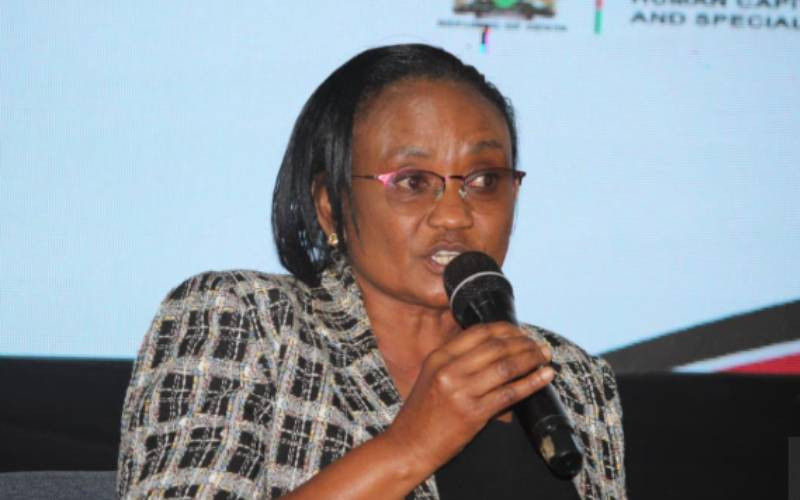
Esther Kinyanjui, Acting Director at the Directorate of Counselling and Wellness Services, speaks during the launch of the Public Service Workplace Policy on HIV, AIDS, and Other Syndemic Diseases on Monday, September 1, 2025. [Bernard Orwongo, Standard]
Nearly six out of 10 public servants in Kenya are struggling with mental health challenges, a new report has revealed, raising concerns over productivity and the well-being of government employees.
Esther Kinyanjui, Acting Director of the Directorate of Counselling and Wellness Services at the Ministry of Public Service, said mental health among civil servants is largely linked to workplace stress, financial struggles, and heavy workloads.
“About 25 per cent of outpatient visits and 50 per cent of inpatient cases in hospitals are linked to mental health conditions. In the public service, the situation is no different. Fifty-nine per cent of public servants are struggling with mental health challenges,” she said.
According to Kinyanjui, the biggest contributor is workload imbalance.
Some officers are overwhelmed with tasks, leaving them with no time for rest, self-care, or family, while others suffer stress from underutilisation and discrimination in the workplace.
“Those with excessive workloads hardly have time for themselves or their families, which affects their well-being. On the other hand, those with less workload feel unproductive and isolated, which is equally stressful,” she explained.
- Meet mental health coach 'Hummingbird,' healing hearts and saving one soul at a time
- 'I want to stop': Young Kenyans open up about struggle with masturbation
- Unmasking the pain behind men's mental health
- One conversation at a time: How Karume is making space for men's mental health
Keep Reading
Women in public service are particularly vulnerable due to dual responsibilities at work and home.
“Female officers juggle professional duties alongside parenting and other family demands, placing them at higher risk compared to the general population,” Kinyanjui added.
Experts caution that poor mental health not only affects the well-being of workers but also hampers service delivery.
“If a public servant is mentally struggling, then their capacity to deliver quality services to Kenyans is compromised,” Kinyanjui said.
To address the crisis, the Directorate of Public Service has rolled out workplace initiatives, including training mental health champions to identify and support colleagues in distress.
“We have health champions across departments who can detect those in need of services and link them to professional support,” Kinyanjui noted.
While progress has been made, she stressed that much more needs to be done to address the burden of mental health in the public sector.
“Mental health challenges are not only workplace-related. They can also be genetic, environmental, or medical. What is clear, however, is that we must prioritise wellbeing in the public service for better productivity and healthier communities.”
Martha Mercy, head of physiotherapy at the Ministry of Health, added that mental health is a disability that must be addressed in the workplace.
“Mental health is a disability. Some people have grown through hardships, some experience pain, and some react differently. We need disclosure mechanisms at the workplace, which are not happening because of stigma. People are called insane. Before human resources, it was about personnel, understanding the person holistically, including their work experience,” she said.

The experts spoke during the ongoing launch of the public service workplace policy on HIV, AIDS, and other syndemic diseases.
Employers are required to support employees in eliminating HIV/AIDS and stigma related to the disease, ensuring they get tested, enrol for treatment, and have their viral load managed.
Data reveal that despite Kenya working toward eliminating HIV/AIDS by 2030, cases of advanced HIV disease and deaths are still reported.
Mother-to-child HIV infection remains a concern, with at least 10 out of 100 newborns infected with the virus.
 The Standard Group Plc is a multi-media organization with investments in media
platforms spanning newspaper print
operations, television, radio broadcasting, digital and online services. The
Standard Group is recognized as a
leading multi-media house in Kenya with a key influence in matters of national
and international interest.
The Standard Group Plc is a multi-media organization with investments in media
platforms spanning newspaper print
operations, television, radio broadcasting, digital and online services. The
Standard Group is recognized as a
leading multi-media house in Kenya with a key influence in matters of national
and international interest.











